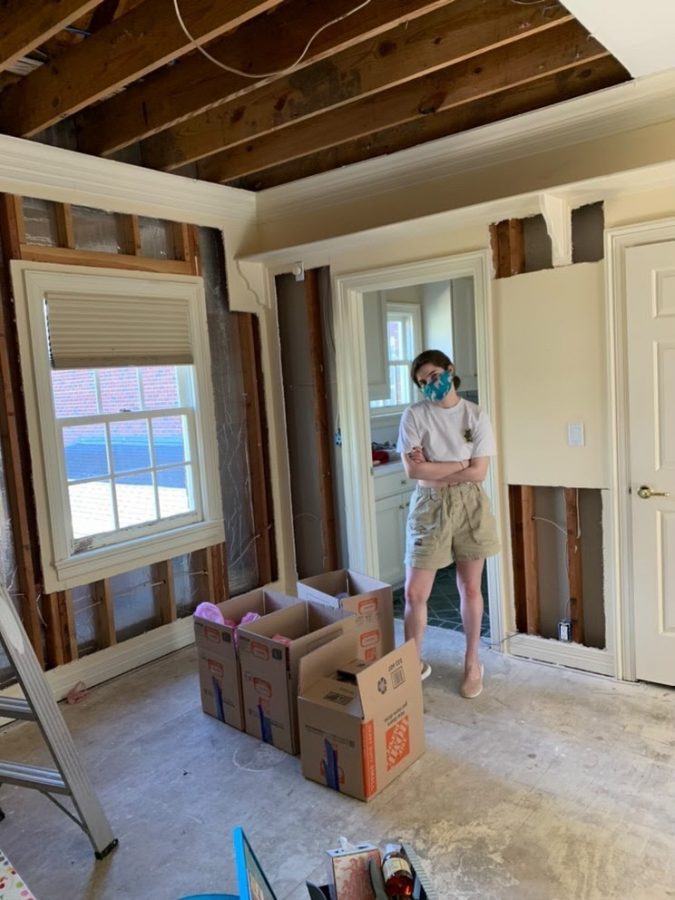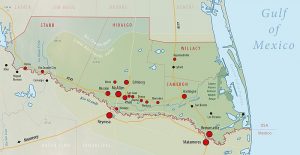Why the People of Texas Were Abandoned by Their State Government
The Texas government is incompetent when faced with difficulty
COURTESY OF CATHLEEN FREEDMAN
Cathleen Freedman, FCLC ’22, stands in her room in Texas where the walls, ceiling and pipes had to be ripped out after damage sustained during the February storm.
March 28, 2021
Time and time again, Texans find themselves victims of severe weather events. 2011, 2015 and 2017 all saw extreme storms and ensuing massive power outages, which left thousands of people without basic accommodations or housing in the wake of their destruction. However, none have been as blatantly horrifying and avoidable as the recent weather emergency: the devastating winter storm that occurred in late February.
Though facing warmer days ahead, Texans are struggling to rebuild their lives after this traumatic event. With recent studies showing that winter storms will only increase in severity in the future, there has been no clearer time for action than now.
So, why are the people of Texas routinely abandoned this way?
The short answer: incompetent governance.
Across the continental United States, there are three main power grids: the Western Interconnection, the Eastern Interconnection, and the Texas Interconnection. The peculiar decision to create the Texas Interconnection and afford a state its own power grid comes purely from the state government’s desire to circumvent federal jurisdiction in their energy operations.
In an article from the Houston Chronicle, journalist Katie Galbraith explains the history of Texas secessionist attitude toward energy: “By not crossing state lines, Texas utilities avoided being subjected to federal rules,” she wrote. “Bottom line: Texas has its own grid to avoid dealing with the feds.”
“Certain policies and actions aren’t changing. This issue, climate change, is just going to get worse if nothing is done.” Cathleen Freedman, FCLC ’22
The lack of concern over an increasingly incompetent grid in the face of extreme weather events has been the source of both recent and past devastation. Ed Hirs, an economics professor at the University of Houston, mentioned the lack of action on the part of state politicians and regulators. “This should have been addressed in 2011 by the Legislature after that market meltdown, but there was no substantial follow up. … They skipped on down the road with business as usual.”
The painful and shameful situation in Texas illuminates the fact that inaction on the part of the state government and the Electric Reliability Council of Texas (ERCOT), the body that undertakes regulatory tasks that would otherwise be conducted by the federal government, has a human death toll.
It must also be noted the significant increase in extreme weather events caused by climate change. When it comes to extreme heat and freezing, there are substantial attribution findings of human influence on these fluctuations. But that alone does not explain why Texans continue to endure power outages and broken pipes year after year.
Government officials and energy companies have refused to adapt systems to withstand a higher energy demand in colder conditions (“winterizing”). So, it is clear the answer lies in infrastructure.
Cathleen Freedman, Fordham College at Lincoln Center ’22, who spent the year at home in Houston due to COVID-19 concerns, has felt the brunt of this governmental incompetence. On Feb. 15, Freedman’s neighborhood lost power before pipes burst in her home, causing the ceiling to collapse in her bedroom.
She and her family were able to seek shelter in local hotels throughout the duration of the storm, but Freedman described the process of finding a hotel with running water and power as a “nightmare.”
In the face of climate disaster, infrastructure preparedness is the only way to reduce harm in communities.
“Houston’s infrastructure is not built to handle these storms. We collectively are going to have to expect more of these storms,” Freedman said. “Certain policies and actions aren’t changing. This issue, climate change, is just going to get worse if nothing is done.”
The Associated Press reported that at least 80 people were killed as a result of the storm. Nightmarish scenes of dead fish floating in rivers are circulating the internet; the Texas Parks and Wildlife Department reported around 3.8 million fish died from being frozen to death.
On top of the human and animal losses these storms have taken, Texans have to face the bitter reality of indifferent representatives taking vacations amid their suffering.
For example, Texas Sen. Ted Cruz was photographed flying to Cancun for a vacation after the storm hit. Freedman gave her thoughts on the political blunder: “The whole situation — so bad. It baffles me that nobody on his team said, ‘This isn’t a good idea.’ … whether it be his actions, or what was supposed to be his apology.”
In the face of climate disaster, infrastructure preparedness is the only way to reduce harm in communities. Green climate policy on a larger scale is certainly a part of this equation, but for now, Texas must be held accountable for protecting its citizens who were literally left in the dark and cold to fend for themselves in February.
Please visit Legacy Collective if you are able to donate resources to help people in Texas rebuild and get essentials.
















